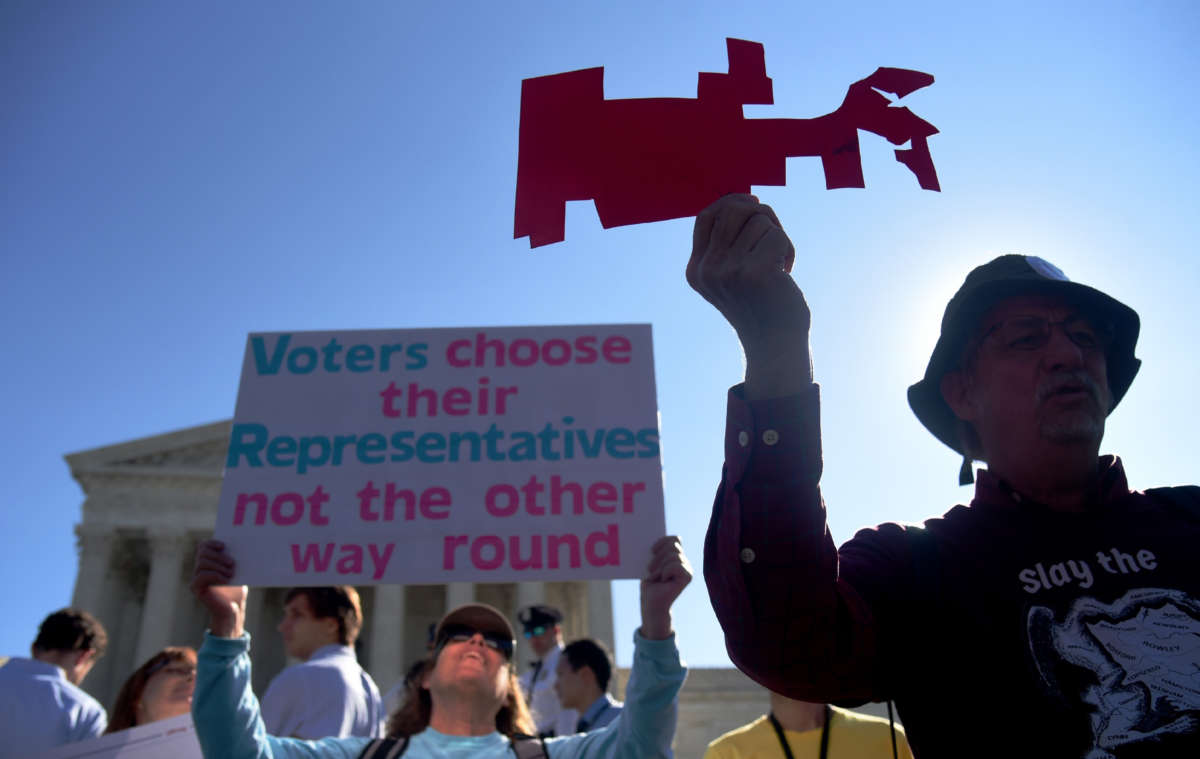A recent analysis of legislative redistricting maps from across the United States showcases the vast influence of political gerrymandering, which will likely benefit the Republican Party in next year’s 2022 midterm races — even if voters’ preferences haven’t changed since Democrats won in 2020.
Polling from this week shows that Democrats are currently losing to Republicans in a “generic Congressional ballot” question, with the GOP ahead of Democrats by 10 points in terms of which party voters want to see running Congress in 2023 and beyond. But even if Americans cast their votes the same way they did last year, the redrawing of maps by itself will give Republicans enough seats to win control of the House of Representatives.
According to reporting from The New York Times, Republicans are set to “flip” five seats in the House from Democrats, based on the proposed maps that are being redrawn in most states. Those five seats will likely change hands not because of voters’ desires for new leaders, but because the maps are “more distorted, more disjointed and more gerrymandered than any since the Voting Rights Act was passed in 1965,” The Times reported.
Currently, Democrats control 221 seats in the House, while Republicans have 213 seats. If five Democrats lose their elections next year, control of the House would switch parties, giving Republicans power over that legislative chamber.
This year’s redistricting process will likely have ramifications for several years to come — at least until 2030, when redistricting will take place again. Many calling to reform the process say that the realignment this year could greatly disadvantage Democrats’ chances of winning control of Congress again, especially in states where races have been more competitive in recent years.
Republicans are “really taking a whack at competition,” said Michael Li, a redistricting expert at the Brennan Center for Justice. “The path back to a majority for Democrats if they lose in 2022 has to run through states like Texas, and they’re just taking that off the table.”
States are constitutionally charged to establish district boundaries every 10 years. And although both parties engage in gerrymandering — the practice of strategically redrawing maps to benefit one party over another — Republicans are more likely to use it to their advantage this year, as they have control over redrawing 187 legislative seats, while Democrats only have control over redrawing 75 seats. (The remaining seats to be redrawn are in states where redistricting is controlled by independent boards, in states with dual-party control, or in states where there is only one House member to vote for.)
Earlier this year, Democrats proposed changes to the redistricting process in the For the People Act, a bill which would have required every state in the U.S. to create independent commissions that would limit the gerrymandering that is inherent in many states’ processes of redrawing political lines.
But the bill failed after it was filibustered by Republicans, along with right-wing Democratic Sen. Joe Manchin of West Virginia, who claimed it went too far in other ways. Manchin pushed for a compromise voting rights bill — the Freedom to Vote Act — with the aim of securing GOP support. However, this legislation was subsequently blocked, and didn’t gain a single vote from Republican senators.
After both bills failed to withstand Republican filibusters, Senate Majority Leader Chuck Schumer (D-New York) suggested that it might be necessary to make changes to the filibuster rule in order to pass voting rights legislation.
“We’re going to take action to make sure we protect our democracy and fight against the disease of voter suppression, partisan gerrymandering and election subversion that is metastasizing at the state level,” Schumer said in September.
Our most important fundraising appeal of the year
December is the most critical time of year for Truthout, because our nonprofit news is funded almost entirely by individual donations from readers like you. So before you navigate away, we ask that you take just a second to support Truthout with a tax-deductible donation.
This year is a little different. We are up against a far-reaching, wide-scale attack on press freedom coming from the Trump administration. 2025 was a year of frightening censorship, news industry corporate consolidation, and worsening financial conditions for progressive nonprofits across the board.
We can only resist Trump’s agenda by cultivating a strong base of support. The right-wing mediasphere is funded comfortably by billionaire owners and venture capitalist philanthropists. At Truthout, we have you.
We’ve set an ambitious target for our year-end campaign — a goal of $112,000 to keep up our fight against authoritarianism in 2026. Please take a meaningful action in this fight: make a one-time or monthly donation to Truthout before December 31. If you have the means, please dig deep.
